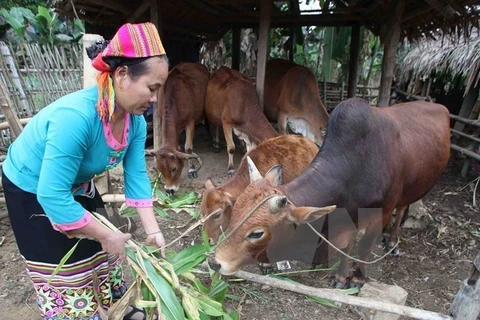Hanoi (VNA) – The poverty rate among households in the country is expected to drop to under 6 percent at the end of this year from 6.7 percent in 2017, the National Assembly Standing Committee heard at its 27th session on September 17.
The figure was part of the Government’s report delivered at the session on the implementation of the National Assembly’s Resolution 76/2014/QH13 on promoting the target of sustainable poverty reduction to 2020.
The report, presented by Minister of Labour, Invalids and Social Affairs Dao Ngoc Dung, also said the household poverty rate in poor districts has decreased at an average 5.43 percent a year, meeting the target set by the resolution. Poverty relapse has been controlled with a downward trend, as shown in the rates of 0.13 percent in 2016 and 0.1 percent in 2017. Ten localities have maintained their record of no poverty relapse.
However, the reduction in poverty rate is not sustainable, and the gap among regions and population groups has not been narrowed, particularly that between the northern mountainous and central highland regions and other regions.
Furthermore, despite the rapid reduction of poverty rate in poor areas, the rate remains at a high level, at 50 percent and even 60-70 percent in some especially poor localities. More than half of the poor households are of ethnic minority groups, and the average income of ethnic minority families is only two fifths of the national average.
A report on the issue of the National Assembly’s Committee for Social Affairs also affirmed that the outcomes of poverty reduction efforts are not sustainable. It said 12 provinces reported a noticeable increase (of 0.03 percent or more) in poverty relapse, and the number of households falling back into poverty is equivalent to one twentieth of those escaping poverty. At the same time, for every four households escaping poverty, one new household falls into poverty. The rate is even higher in localities hard hit by natural calamities such as storms and floods.
Many members of the NA Standing Committee noted that the rate of poverty relapse is high some provinces with good socio-economic development such as Kien Giang and Khanh Hoa, which calls for effective solutions.
Head of the NA Ombudsman Committee Nguyen Thanh Hai called attention to the fact that most districts with high rate of poverty are in the northern mountainous provinces such as Dien Bien, Cao Bang and Yen Bai. He questioned why the rate of poverty reduction is different among areas despite the same mechanism, policies and resources, and why most of the poor districts are in the northern mountainous region.
Answering the question, Minister Dung said one of the main causes behind the increase in poverty and poverty relapse is the impact of frequent storms and floods, with examples like Yen Bai, Lao Cai, Lai Chau provinces, and most recently Thanh Hoa.
Another reason is the division of households to form new ones, he said.
Participants proposed that the NA and NA Standing Committee ensure sufficient finance for the national target programme on sustainable poverty reduction in 2019 and 2020, and provide additional funding to carry out some urgent tasks in this realm, especially in addressing housing and health care issues for the poor, which are essential factors in ensuring social security and order.
NA Chairwoman Nguyen Thi Kim Ngan affirmed that the State has never cut budget allocation for social security in any circumstances. However, in order to solve the outstanding problems in poverty reduction, it is necessary to clarify the responsibility of local administrations in the work, and pinpoint the reason why many households do not want to rise out of poverty, she said.
The NA leader also stressed the need to multiply effective models in poverty reduction, and promote education campaigns to raise the awareness of both society and administrations about self-reliance in escaping poverty.
Eliminating poverty is the responsibility of the entire political system, Chairwoman Ngan said, adding that the NA will conduct supreme supervision of the work and a review of the implementation of the National Assembly’s Resolution 76/2014/QH13.-VNA
























